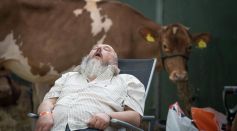Tags: Sleep
Neuroscientists Reveal How Alcohol Ruins Sleep

6 Amazing Food and Drinks You Should Try Before Sleeping
5 Signs That Your Coffee Addiction Is Hurting Your Health

Study Reveals Sleep Evolved Ahead of Brain Evolution

Sleeping in Two Shifts Used to Be the Norm: What Are Its Benefits and Best Practices?
What Is the Most Linked Factor to Having Better Mental Health?

Do You Have Sleep Apnea? Here’s What It Can Do to Your Heart

Lack of Sleep Possibly an AI Issue, Study Finds
What Do Dogs Dream About While Sleeping?

Study Shows Link Between Healthy Sleep Habits and Lower Risk of Heart Failure

Discovering Sleep Behavior of Animals: Which are the Best Sleepers, and Which Ones Sleep the Least?
Tiny Worm Reveals Why Melatonin Makes Us Sleepy
Our Body Clocks Affect the Mood, Appetite, Physical Activity, and Productivity
How to Fall Asleep: Hacks, Tips, and Habits To Help You Get a Goodnight Sleep
Man With Severe Brain Injury 'Cured' 20 Minutes After Taking Sleeping Pill
New Study Suggests White Noise for Sleeping May Do More Harm Than Good
Hibernation Explained: Vital for Some Species, but Not Humans

Lack of Sleep Among Americans Worse For Men, Says Study

MIT Develops Sleep-Tracking Device That Alters Dreams to Boost Creativity

Insomnia Linked to Increased Risk of Developing Type 2 Diabetes
Most Popular

Will Earth's Magnetic Poles Flip Next? Magnetic Pole Reversal Explained Through Cutting‑Edge Magnetosphere Science

Relativity Time Dilation Explained: The Physics of Time and Why It Moves Differently in Space

How Lightning Science Reveals Why Charged Storms Are Rising with Global Warming Effects

De-Extinction vs. Conservation Science: Which Approach Protects Biodiversity Most Effectively?





